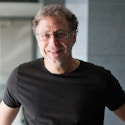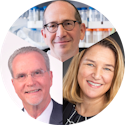By clicking to watch this video, you agree to our privacy policy.
On May 14, 2021, Federico Bolognani, Stuart Cobb, and Yael Weiss joined a panel to discuss new industry developments on the use of small molecules, gene therapy and antisense oligonucleotides as treatment approaches for autism spectrum disorders (ASD). The panel’s discussion was moderated by Randall Carpenter.
About the Panel
Advances in the basic science of human health and disease can be credited primarily to academic research, but the development and clinical testing of new treatments is led almost always by the pharmaceutical or biotech industries. In this panel, industry leaders Federico Bolognani, Stuart Cobb and Yael Weiss provided their perspectives on three different treatment approaches that are currently being pursued for ASD and related conditions: small molecules, gene therapies and antisense oligonucleotides (ASOs).
The panel discussion, moderated by Randall Carpenter, addressed such questions as: When and why might one approach be more appropriate, or more promising, than the others? What challenges face each approach? What “pre-competitive” research is still needed to advance these treatment approaches?
Federico Bolognani, M.D., Ph.D.
Talk title: Small molecules for the treatment of autism: Teaching an old dog new tricks
Stuart Cobb, Ph.D.
Talk title: The challenges of gene therapy for neurodevelopmental disorders
Yael Weiss, M.D., Ph.D.
Talk title: Antisense oligonucleotides—A view from the flight deck
Inquiries: [email protected]
About the Speakers
Federico Bolognani obtained his M.D. and Ph.D. degrees from the National University of La Plata, Argentina. He has worked as a research fellow at the University of Manchester School of Medicine Molecular Medicine Unit, a research assistant professor at the University of New Mexico School of Medicine and a research associate at the Houston Methodist Hospital Department of Neurosurgery in the Texas Medical Center developing translational programs in neuroscience. In 2009, he moved to Basel, Switzerland, to lead the Novartis Safety Genomic group at the Novartis Institutes of Biomedical Research (NIBR) where he led a global group of medical doctors and researchers involved in translational drug development with a focus in safety. In 2013, he joined the Roche Neuroscience Disease Area, where he led different clinical programs to develop new drugs for neurodevelopmental conditions, especially autism spectrum disorder. Since 2018, he has worked in the biotechnology sector developing drugs for neuroscience indications, including autism (Therachon, VectivBio, Axial Therapeutics). Bolognani has published more than 50 neuroscience papers in journals such as Nature Medicine, Science Translational Medicine, Journal of Neuroscience, Autism, Autism Research, Molecular Psychiatry, Biological Psychiatry, amongst others.
Stuart Cobb heads a translational research group that is focused on developing genetic therapies for severe neurological and neurodevelopmental disorders. His research aims to address the tractability of severe brain disease to genetic rescue and to develop innovative therapeutic solutions for clinical translation. In addition to his academic research, Cobb is the chief scientific officer at Neurogene, Inc, a clinical stage gene therapy company developing gene therapies for severe neurological indications.
Yael Weiss received her M.D. degree from Hadassah Medical School in Jerusalem, and her Ph.D. in molecular genetics from the Weizmann Institute of Science in Rehovot, Israel. After practicing medicine at Sheba Medical Center for several years, Yael joined Columbine Ventures and then joined Genzyme Israel as the director of medical affairs and business development. In 2004, Yael joined Merck Israel as the medical director, a role in which she oversaw Merck’s clinical trials and supported the sales and marketing organizations. In 2007, Yael relocated to the San Francisco Bay Area to take the position of the director of external scientific affairs and worldwide licensing, west coast, and later headed the group that evaluates the clinical, regulatory and safety aspects of Merck’s regional deals globally. Currently, Yael is the vice president of business development for Ultragenyx, a company specializing in development of therapies for the treatment of rare genetic conditions. In her role, Yael is responsible for sourcing and evaluating potential pipeline opportunities for Ultragenyx.
Randall Carpenter is a biotechnology executive with over 35 years of leadership experience in academics, medicine, research and therapeutic development. Previously serving in senior management positions at Astra Pain Control, Adolor Corporation, Cypress Bioscience, Sention, Seaside Therapeutics and Quadrant Bioscience, he is the co-founder of Seaside Therapeutics and Allos Pharma. Development efforts have focused for the past 20 years on translating basic science discoveries into novel therapeutics for Rett syndrome, fragile X syndrome, autism and intellectual disability. Prior to joining industry, he held academic faculty appointments at Virginia Mason Medical Center, the University of Washington and Wake Forest University, where he specialized in anesthesiology, pain management and translational medicine. He currently serves as a research affiliate at the Massachusetts Institute of Technology Department of Brain and Cognitive Sciences and as a member of the scientific advisory boards of the European Autism Interventions – A Multicentre Study for Developing New Medications (EU-AIMS) and the Translational Neuroscience Center of Boston Children’s Hospital.


